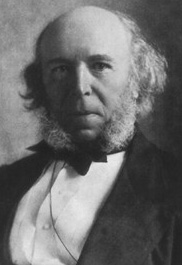Artículos y propuestas :: Educación
Herbert Spencer (1820-1903)
 Spencer was born in Derby, England on 27 April 1820, the eldest of nine children, but the only one to survive infancy. He was the product of an undisciplined, largely informal education. His father, George, was a school teacher, but an unconventional man, and Spencer’s family were Methodist ‘Dissenters,’ with Quaker sympathies. From an early age, Herbert was strongly influenced by the individualism and the anti-establishment and anti-clerical views of his father, and the Benthamite radical views of his uncle Thomas. Indeed, Spencer’s early years showed a good deal of resistance to authority and independence.
Spencer was born in Derby, England on 27 April 1820, the eldest of nine children, but the only one to survive infancy. He was the product of an undisciplined, largely informal education. His father, George, was a school teacher, but an unconventional man, and Spencer’s family were Methodist ‘Dissenters,’ with Quaker sympathies. From an early age, Herbert was strongly influenced by the individualism and the anti-establishment and anti-clerical views of his father, and the Benthamite radical views of his uncle Thomas. Indeed, Spencer’s early years showed a good deal of resistance to authority and independence.
A person of eclectic interests, Spencer eventually trained as a civil engineer for railways but, in his early 20s, turned to journalism and political writing. He was initially an advocate of many of the causes of philosophic radicalism and some of his ideas (e.g., the definition of ‘good’ and ‘bad’ in terms of their pleasurable or painful consequences, and his adoption of a version of the ‘greatest happiness principle’) show similarities to utilitarianism.
From 1848 to 1853, Spencer worked as a writer and subeditor for The Economist financial weekly and, as a result, came into contact with a number of political controversialists such as George Henry Lewes, Thomas Carlyle, Lewes’ future lover George Eliot (Mary Ann Evans [1819-1880])–with whom Spencer had himself had a lengthy (though purely intellectual) association–and T.H. Huxley (1825-1895). Despite the diversity of opinions to which he was exposed, Spencer’s unquestioning confidence in his own views was coupled with a stubbornness and a refusal to read authors with whom he disagreed hinkers such as Robert Nozick.
